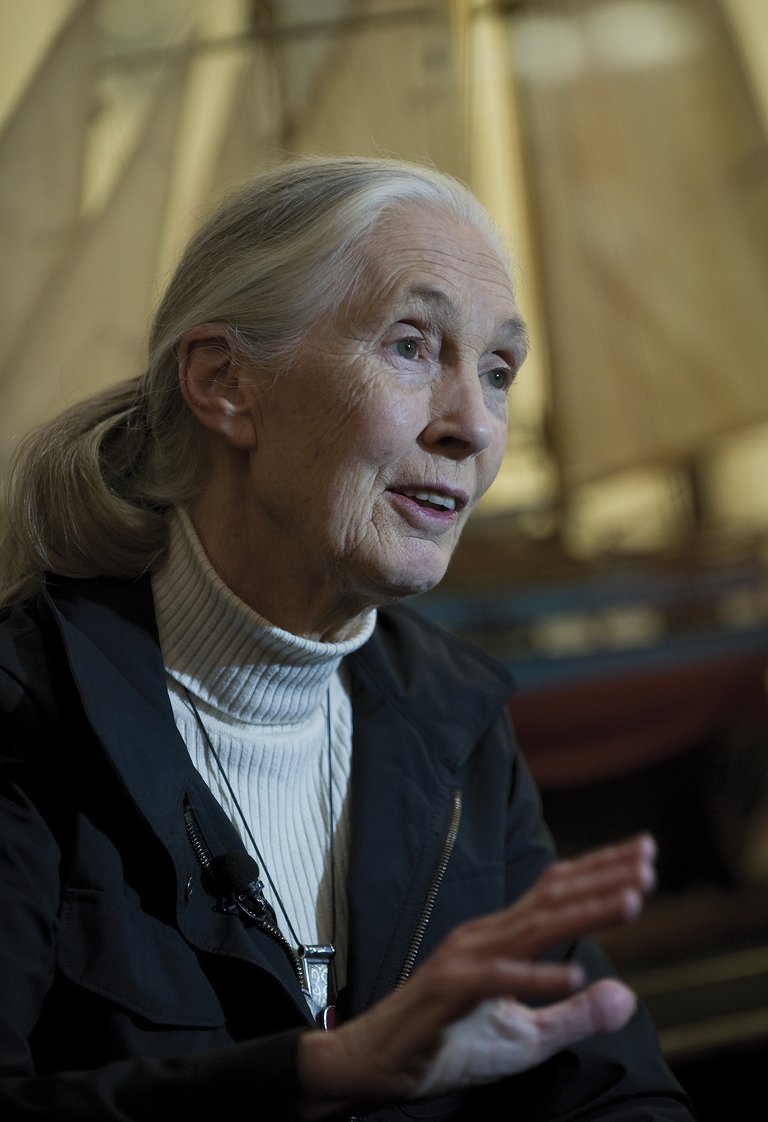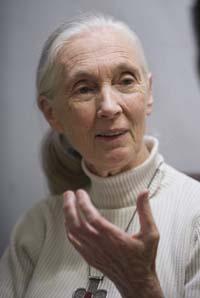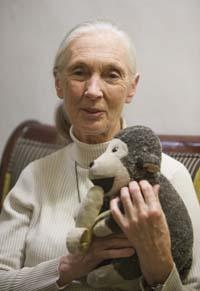"I thought we were chimpanzees and we were similar, but they were more pleasant"

No, I didn't expect it. I was 23 when I went to Africa with Louis Leakey and with the chimpanzees I did not start until 26. And in those times the longest investigations were one year. There was no possibility of carrying out longer studies.
It was very frustrating because the chimpanzees were leaving. For three or four months they were kicked. Every time they saw me. They are very prudent and never saw a white monkey until it appeared to me. They looked and disappeared in the vegetation. I needed a lot of patience. And although it is always a dream life, I knew that if I saw nothing shocking the money was going to disappear. There was money for six months. I had no studies. It was a dispurpose, really. But fortunately, I saw it using and making tools, which guaranteed National Geographic money.
I had a very magical feeling put me next to a group of chimpanzees and they did not jump the first time. In the end they accepted me! It was wonderful.
Well, it's hard to say, because they do as many exciting things as learning… but what fascinated me most was the relationship between mothers and offspring and the development of offspring. We now know that, as a result of a long-term study, the type of maternity and initial experiences have a huge influence on the development of the offspring. You know, there are good mothers and bad mothers, and child psychologists are increasingly aware of the importance of early childhood experiences. Among the mother-son relationships of chimpanzees I saw, for example, that offspring can also die if the mother dies, with pain. And the first people who were interested in these behaviors were not zoologists or biologists, but children's psychologists. It was in 1962.
It was a decisive observation, because thanks to this we got the money. It was the chimpanzee I called him David Greybeard: I saw him bend on a hill of termites and using pieces of grass to catch the termites. And then I saw him picking up a branch and removing his leaves... that is, I saw him making an instrument. The observation was very exciting.

No, that observation did not surprise me. In fact, I read about captive chimpanzees and knew they are able to use tools. But the people, the scientists, were so proud! It was considered that if during captivity they were able to use tools, they were due to some wonderful human behavior. Therefore, this behavior was impossible for this type of wild chimpanzees, skeletal and simple.
Oh!, I was surprised by cannibalism and it shook me: that the females ate newborn offspring, members of their same social group, or that the males patrol in the limit of their territory attacking the females and leaving them to die, and that they take and kill the offspring. I did not see them eating, but let them die in any case.
I was thrilled because I thought we were chimpanzees and we were similar, but they were more enjoyable. I made truly sad chronicles, when I realized that they also have that dark side of nature. Since then, I find myself much more similar between us and them.
We have learned a lot of evolution. Louis Leakey wanted me to study chimpanzees, because he thought that if in today's chimpanzees and humans we observe a certain behavior, the common predecessor of both, a monkey of human characteristics, would have the same or similar behavior, six million years ago.
Therefore, this behavior has been of both chimpanzees and humans in an evolution of six million years. Leakey had interest because he thought it could be a good way to understand the behavior of the ancient man. He was looking for fossils, remains of ancient human beings.
On the other hand, it has helped us to understand that we have aggressive behaviors without a doubt. Therefore, many people say that "then, that means that in humans violence and war are inevitable." But I don't think they are inevitable. Similarly, we can note that the tendencies towards love, compassion, and altruism have also evolved with us. And it is that chimpanzees also have these characteristics. So it is in our hands. I think we all have those two facets of nature, inherited from our past primate. I, at least, know that I have them.

We caused a great change to eat when we gave them bananas. They met much more and more often. Then we started to give very little banana, sometime, and returned to their previous behavior. In fact it was something remarkable. Now we do not give them any kind of food.
Today I believe that the relationship between groups of chimpanzees of Gombe is the one that most influences. There are three different communities and only the middle one is really used to being there. Therefore, if we go behind one of our chimpanzees and this one goes to the border [of their territory] and there are some group of the neighboring community, we frighten them and flee. This gives advantage to our chimpanzees. In fact, instead of getting up and meeting a group that could have aggressive behavior, they find individuals who escape.
No, at all. The little ones want to go up and explore, play. At one time, at first, I let them play, why not? Then I did not realize that they can take all our diseases and therefore it is very dangerous. But considering that for a year the chimpanzees were fleeing from me, in the end getting to play one was impressive, exciting.
However, looking back, it was not something good. At first, clothes were tested and stolen; they loved sucking clothes. But no, we had no relationship beyond that neutral trust. I didn't do it like Dian Fossey. He joined the gorillas and became a member of his society. I don't. I wanted to observe them.
It was held in 1986, in a great day in which all the people who worked with chimpanzees met. After the first conservation session. The situation was huge, across Africa, from extreme to extreme: the habitat was disappearing, for the food being hunted chimpanzees... And on the other hand I knew the conditions they had in captivity. They showed hidden filmed recordings, chimpanzees of medical research laboratories, and chimpanzees introduced in boxes of five feet for five feet, touching the walls with the head... So I entered that four-day meeting when I was a scientist and went out as an activist. Since then, I travel 300 days a year.
Buletina
Bidali zure helbide elektronikoa eta jaso asteroko buletina zure sarrera-ontzian








